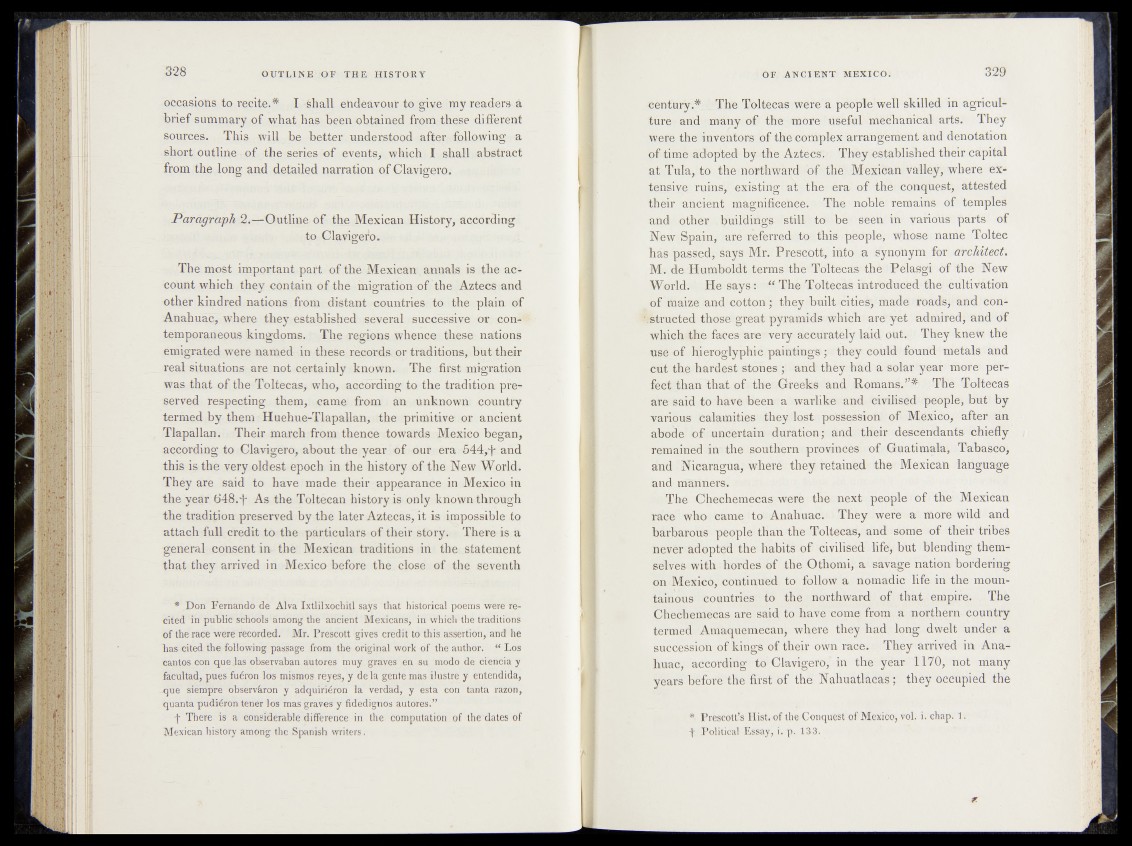
occasions to recite.* I shall endeavour to give ray readers a
brief summary of what has been obtained from these different
sources. This will be better understood after following a
short outline vof the series of events, which I shall abstract
from the long and detailed narration of Clavigero.
Paragraph 2.—Outline of the Mexican History, according
to Clavigero.
The most important part of the Mexican, annals is the account
which they contain of the migration of the Aztecs* and
other kindred nations from distant countries to the plain of
Anahuae, where they established several successive or contemporaneous
kingdoms. The regions whence these nations
emigrated were named in these records.or traditions, but their
real situations are not certainly known. The fitsfe migration
was that of the Toltecas, who, according to the tradition pre*
served respecting them, came from an unknown country
termed by them IIuehue-Tlapallan, the primitive .or ancient
Tlapallan. Their march from thence towards Mexico began,
according to Clavigero, about the year o f our era 5 4 4 , and
this is the very oldest epoch in the history of the New World.
They are said to have made their appearance in Mexico in
the year 848.T As the Toltecan history is- only known through
the tradition preserved by the later Aztecas, it is impossible to
attach full credit to the particulars of their story. There is a
general consent in the Mexican traditions in the .statement
that they arrived in Mexico before the, close of the seventh
* Don Fernando de Alva Ixtlilxochitl says that historical poems were recited
in public schools among the ancient Mexicans, in which the traditions
of the race were recorded. Mr. Prescott gives credit to this assertion, and he
has-cited the following passage from the original work of the author. “ Los
cantos con quejas observaban autores muy graves en su modo de ciencia y
facultad, pues fu£ron los mismos reyes, y de la gente mas ihlstre y entendida,
xjue sfempre observhron y adquirieron la' verdad, y esta con tahta razon,
quanta pudieron tener los mas graves y fidedignos autores.”
b There is a considerable difference in the computation of the’dates of
Mexican history among the Spanish writers.
eèntury* É The Tolfeeas were a péóplc'well skilled in agriculture
and many of' the more'useful mechanical arts. They
were the inventors of the complex arrangement and denotation
of time- adopted by 4he Aztecs'. They ëstablished'their capital
at Tula, to the morth ward of'-the Mexican valley, where extensile/
ruins, existing at ■ the era' of thé' cctejhest, attested
their aneient magmifi'G,qhce.tThe nobler remains: of: temples
and. other- buildings. stilL- to be^jadem in various1 parts of
NewvSpain, jÊffiéïrêfërredeto this -people; whose name Toltee
has passed;; éays Mr. Prescott,-into a synonym foti architect*.
M^ de Humboldt terms .the Tdltecasithè^Pélaggi' of the ’New
World.' He says': The ToltecSs introducédMbhé^èultivation
of maize and cotton^ they built cities'; made-road’s^- and coto
retructed those1'1 great pyramids'which atoyet -ad^iredp and of
which »the faces' are' very 'acwfratfely laid, out.-:' Theyhne'iv thé
usêof hiepoglyphic paintings1.; ^hey« could found metals and
cut the hardest stones»p > a n i they had a solar ycap WNr# perfect
than that of- thte^Gheeks and Romans.”* The Toheeas
are said to have "been«1 a warlike and civilised-people*,but'by
various calamities they lostopoksession/' of Mexitk^ after an
abode^ of;uncertain duration,- and ?their>ideéeéddants'chiefly
remained in the southern provinces of Guatimala, >Tabasco;
and Nicaragua, wherè they retained then Mexican language
and manners.
The ‘©foechemecas werè the next people of the Mexican
race who eatne -to Anahuae. They were a more Wild and
barbarous people than the Toltecas, and: >sOme *of their-tribes
never adopted the habits of civilised'*, life, but blending, themselves
with hordes Of the Othorni, a--savage nation- bordering
on Mexico, continufed to follow a nomadi^ltfein thè mountainous'.
countries to the n o rthw a rd s-th a t. enarafe- r The
Chechemecas are said to have'cöme from. a.'.northern-, country
termed Amaquemecan, where they had/.long’ dwelt under a
succession of kings of their own race.* They arrived in Ana^
huac, according'tö’Clavigero/-in thel-yëar 1170/^not many
yéars before the fifsf of thé Nahuatlaè&k; ‘ thèy occupied the
*• Prescott’s Hist, of tfie Conquest of Mexico, vol. i. chaplH^^
f Political Essay, i. p.133.